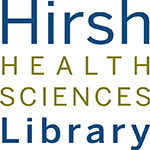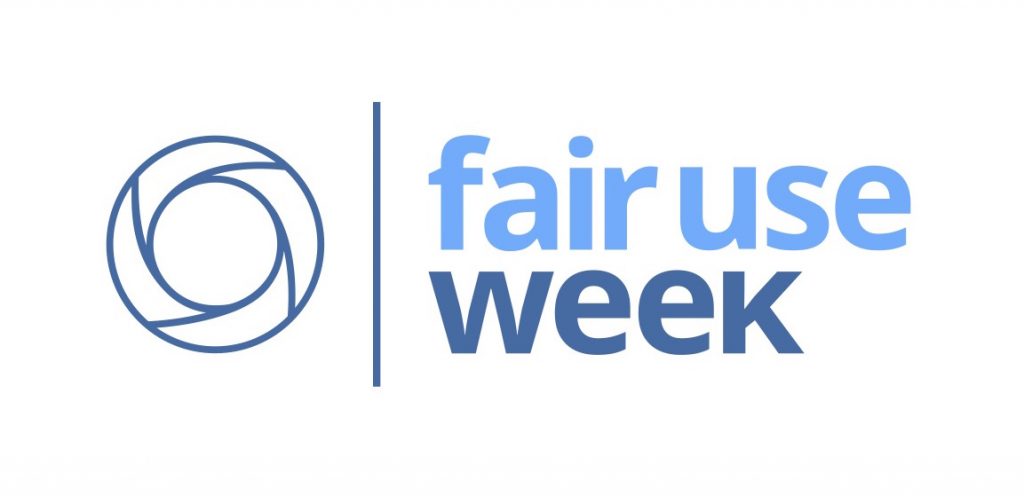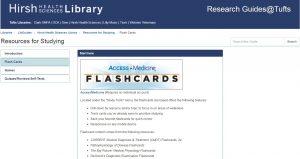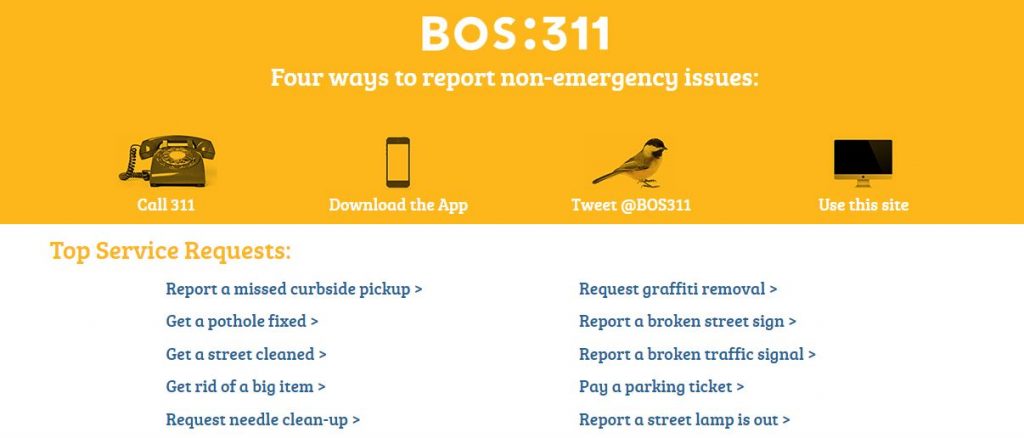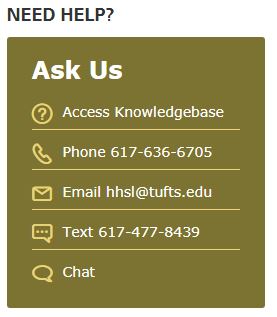Fair Use Week, We Hardly Knew Ye
Time flies, and we’re already wrapping up Fair Use Week, the annual event where we rally to educate and celebrate the provisions under the law that allow us to report the news, innovate in science, make art, create parody, and use works for scholarly interpretation.
[…]
Time flies, and we’re already wrapping up Fair Use Week, the annual event where we rally to educate and celebrate the provisions under the law that allow us to report the news, innovate in science, make art, create parody, and use works for scholarly interpretation.
Over the last few years, more and more questions have popped up regarding Fair Use and social media. Can you Instagram that logo? Can you Tweet that artwork? Can you share that book chapter on Facebook? Our favorite Fair Use Infographic offers some guidance, reminding us that “courts are much more likely to uphold a use as fair use if it is transformative, meaning that it adds something new, with a different character, expression, meaning or message, or function.” So what does that mean in the land of ‘grams, tweets, snaps, and shares?
A 2016 case, Lenz v. Universal Music Corp., ruled that copyright holders must consider Fair Use before before attempting to remove or suppress online content. But what is “transformative” in the social media landscape? It appears grabbing a photo from Flickr and tweeting it to make a statement about refugees (as Donald Trump, Jr. did) doesn’t count. How about posting hyperlinks to copyrighted materials? That’s an evolving issue.
As of right now, the best advice we can offer is to treat anything you do in the online environment as you would in the offline environment. Consider the Four Factors before you post, consider sourcing images from some of the fantastic Open Access and Creative Commons resources out there, and when in doubt, contact a librarian!
We hope you enjoyed Fair Use Week 2018!
February is Research Project Boot Camp Month!
Currently working on a thesis/Capstone/ALE or other research project? Want to jump start your project?
Then Research Project Boot Camp Month is for you!
During the month of February, Hirsh Library will be offering a 5-workshop ‘boot camp’ for students undertaking research projects.
Workshops are held on Tuesday 9-10am and then […]
Currently working on a thesis/Capstone/ALE or other research project? Want to jump start your project?
Then Research Project Boot Camp Month is for you!
During the month of February, Hirsh Library will be offering a 5-workshop ‘boot camp’ for students undertaking research projects.
Workshops are held on Tuesday 9-10am and then repeated on Wednesdays 3-4pm (unless otherwise noted). Workshops are held in Sackler 510.
Registration for in-person sessions is encouraged: http://hirshlibrary.tufts.edu/services/open-workshops
Please select the “Register” link if you would like to attend the workshop remotely via WebEx.
Approaching the Lit Review
Tuesday February 6
Register for WebEx
In this workshop, students will learn how to approach the literature review. Topics covered include database selection, devising effective search techniques, limiting articles to relevant study-types, and tools for keeping track of results.
Which Citation Manager Should I Choose?
Tuesday February 13
Register for WebEx
Wednesday February 14
Register for WebEx
This workshop will provide a “lay of the land” regarding citation managers, such as EndNote, Zotero, Mendeley, RefWorks, and others. We will discuss how to select the citation manager that is just right for your project.
“Are You My Resource?” How to Pick the Right Resources for Your Project
Tuesday February 20
Register for WebEx
Wednesday February 21
Register for WebEx
This workshop will review how to identify and locate resources for your research topic. We will discuss how to identify key stakeholders, how to locate article database by topic, ‘grey literature’ and ‘trade literature’ and how to find it.
Copyright and Your Thesis
Tuesday February 27
Register for WebEx
Various aspects of creating your thesis or dissertation may involve copyright. Whether you are incorporating other people’s content, such as graphs or images, reusing some of your own work, publishing all or part of your thesis content, there are copyright considerations that can seem challenging and daunting to address. This workshop will provide guidance in navigating the questions and decisions that come up during the thesis and dissertation process around your rights and the rights of others.
EndNote: the Basics
Wednesday February 28
This one-hour session will introduce you to the basics of using the EndNote citation management program. EndNote allows you to create a personal database of references and generate in-text citations and bibliographies in a variety of citation styles. This session is for absolute beginners – no previous experience is required!
We hope you’re enjoying running your searches and managing your research and library account using JumboSearch, Tufts Libraries’ one-stop shop to search for books and e-books, videos, articles, digital media, and more.
Because JumboSearch does so much, and is a big change from the library catalogs you may be […]
We hope you’re enjoying running your searches and managing your research and library account using JumboSearch, Tufts Libraries’ one-stop shop to search for books and e-books, videos, articles, digital media, and more.
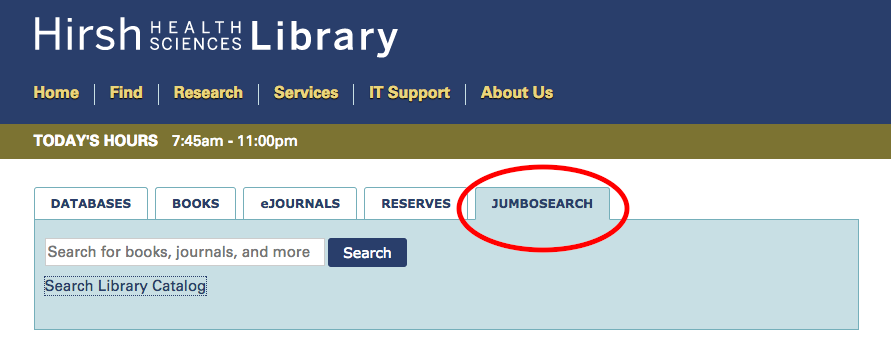
Because JumboSearch does so much, and is a big change from the library catalogs you may be accustomed to using, we’ve built custom Search Help, by Tufts Librarians, for Tufts Users! You can find the link on the top menu of every JumboSearch page.

If you’re stuck searching for books on Reserve for your class, struggling to find a particular journal or a book, wishing to explore the holdings of the Tufts Digital Library, or wondering how to explore the collection in your local Tufts library, our Search Help is here to…help.
Of course, if you run into trouble using JumboSearch you can always stop by the Library Service Desk on Sackler 4, give us a call at 617-636-6705, shoot us an email at hhsl@tufts.edu, text us at 617-477-8439, or chat us up!
Look, we know it’s a BEAR of a time right now…exams, assignments, travel, holidays!
Remember, when you’re busy, we’re busy. Don’t get shut out in the cold, PLAN AHEAD!
Leave plenty of time to snag the books and other resources you need to study for exams (and don’t forget to bring […]
Look, we know it’s a BEAR of a time right now…exams, assignments, travel, holidays!

Image taken from page 54 of ‘The Frozen Crew of the Ice-bound Ship; or, the Terrors of the arctic regions. A romance of the wild and wonderful. With illustrations’ is made available by the British Library and has no known copyright restrictions.
Remember, when you’re busy, we’re busy. Don’t get shut out in the cold, PLAN AHEAD!
Leave plenty of time to snag the books and other resources you need to study for exams (and don’t forget to bring them back on time and avoid The Block!).
If you’d like to work with a librarian, you are always welcome to stop by the Service Desk on Sackler 4, but to avoid lines and waiting, why don’t you schedule an appointment with your liaison librarian? Check out the librarian dedicated to your school or program here: https://hirshlibrary.tufts.edu/research/liaison-program, and book an appointment by clicking on a librarian’s name and then clicking the “Schedule Appointment” button.
Need an appointment in a hurry? Fill out the Schedule a Consultation form and we’ll be in touch ASAP. Appointments are available Monday -Friday, 8 am to 5 pm, as schedules permit.
It’s that time of the semester – finals! While everyone has their own way of preparing for exams, perhaps you wish there were other tools or techniques out there that might take your study skills to the next level. If that sounds like you, please check out our new guide:
[…]
It’s that time of the semester – finals! While everyone has their own way of preparing for exams, perhaps you wish there were other tools or techniques out there that might take your study skills to the next level. If that sounds like you, please check out our new guide:
“Resources for Studying”
http://researchguides.library.tufts.edu/studying_resources
This guide will connect you with tools to help augment your current repertoire of study skills. Tools listed on the guide include interactive quizzes, build-your own flashcards, and games. While many resources featured in this guide are available only to Tufts-affiliated users, others are freely available to use.
Now back to studying!
As we wrap up our celebration of Open Access Week, this is a great time to think about what Open Access can mean to researchers, to scholars, and to our local, national, and international communities. Librarians promote publication in Open Access journals to enable collaboration with like-minded researchers and […]
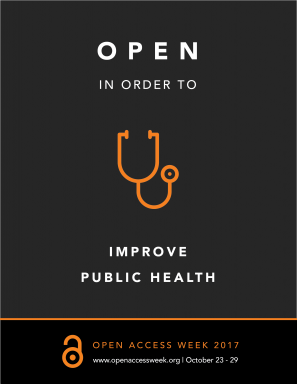
Open in order to improve public health by Nick Shockey is licensed under CC BY 4.0
As we wrap up our celebration of Open Access Week, this is a great time to think about what Open Access can mean to researchers, to scholars, and to our local, national, and international communities. Librarians promote publication in Open Access journals to enable collaboration with like-minded researchers and to raise research visibility, but there are many reasons to wade into the Open Access waters. One of the most compelling is to increase knowledge of science, research, and medicine outside the Ivory Tower.
Think about how easy it is access the latest research in highly regarded journals from the comfort of the Library, or from home (if you go through the proxy server) as a student, faculty, or staff member of Tufts University. But how many times have you tried to access a scientific study from off-campus and run into a paywall? How many times has a newspaper or blog made a claim about a health benefit or some groundbreaking research, only to link out to a journal you can’t access? Think about everyone NOT studying at or employed by a college or university…where do they get their scientific information?
Turns out, the Pew Research Center recently published a study about how Americans consume science news, and they report that 66% of Americans “actively seek out and directly consume” news about science, and the overwhelmingly popular source of that information is outlets like newspapers and television news programming. However, many of these consumers feel that news media does a poor job covering scientific topics (41%) and that some of those reasons include: hasty reporting of findings that may not hold up, oversimplification, overreporting of conflicting viewpoints, and coverage of findings that are not important.
If you work in or study health sciences, you watch this play out on the evening news every day, usually regarding whether or not red wine will make you live forever, if chocolate replaces working out, if coffee will kill you, or if you actually need to floss your teeth (Note: please keep flossing). But who do Americans blame for this? Most participants in the Pew Study blamed the news media, but nearly a quarter (24%) blamed poor scientific reporting on the “way science researchers publish.”
Well well well. We might not be able to change every newscast and every newspaper, but a major way to improve scientific communication is to publish research that EVERYONE can read. For free. Open Access! Think of all the questions that can be answered when patients and health care providers outside of colleges and universities can access quality research free of charge. Think of the advances when researchers can find, use, and reinterpret data without copyright restrictions or paywalls.
Check out the Scholarly Publishing and Access Resources Coalition’s reasons to support open access to aid scientific communication here: https://sparcopen.org/open-access/.
As classes begin to pick up again, we wanted to share a resource that the City of Boston offers its residents. Street light out on your walk home? Trash not picked up? Report it easily with BOS: 311 , a service created by the city of Boston to make sure that these issues are taken care of. Become a neighborhood reporter by calling 311, downloading the app, tweeting to the city, or submitting a report on the site. There are similar programs in Somerville and Cambridge as well. Live somewhere else? Let us know if your town has a service!
Issue in the library? Tell us! Report it at the Library Service Desk on the 4th floor or choose your preferred method of contacting us on our homepage under “Ask Us”.
There is no better time to pick up new skills for the upcoming school year than now!
Tufts University subscribes to Lynda.com, which is a free online video-tutorial resource available to Tufts University students, faculty, and staff. It provides training in software such Microsot Office, Adobe products, data analysis and visualization […]

Image Source: https://pixabay.com/photo-1238602/
There is no better time to pick up new skills for the upcoming school year than now!
Tufts University subscribes to Lynda.com, which is a free online video-tutorial resource available to Tufts University students, faculty, and staff. It provides training in software such Microsot Office, Adobe products, data analysis and visualization tools, in addition to programming languages, and topics found under these broad categories:
- 3D + Animation
- Audio + Music
- Business
- CAD
- Design
- Developer
- Education + Elearning
- IT
- Marketing
- Photography
- Video
- Web
You can refine your skills in teaching techniques, public speaking, IT security, improve written communication, accounting, new standards, leadership skills, accessibility, how to use specific software and the list goes on! Lynda.com also offers learning paths that include a succession of videos on a focused topic.
To access Lynda.com and for more information, go to: https://it.tufts.edu/lyndacampus or login by clicking the graphic below!
Post contributed by Berika Williams
We thought it was great that the 4th was a Monday last year, since it gave us a 3-day weekend, but we’re thrilled that the Tuesday holiday this year gives us a 4-day weekend! The weather forecast looks good, so why not take advantage of all the 4th of July activities […]
We thought it was great that the 4th was a Monday last year, since it gave us a 3-day weekend, but we’re thrilled that the Tuesday holiday this year gives us a 4-day weekend! The weather forecast looks good, so why not take advantage of all the 4th of July activities in the Boston area?

Fireworks Over Boston by Mike Halsall is licensed under CC BY-ND 2.0
The quintessential Boston 4th of July celebration is the Boston Pops performance and fireworks show on the Esplanade. Visit the official event website for a rundown of the schedule and more event details. CBS Boston has also put together a handy guide with viewing location suggestions and other useful tips. Want to hear the music but don’t want to deal with the crowds on the 4th? The Pops will be doing a rehearsal (minus fireworks) on Monday July 3rd.

Harborfest Drummers 1 by Greater Boston Convention and Visitors Bureau is licensed under CC BY-NC-ND 2.0
For fun throughout the weekend, head down to Boston Harborfest . Dedicated to celebrating Boston’s harbor and history, it’s the largest 4th of July festival in the country and features tons of activities, some free and some paid. Here’s the full schedule.

Newton Fireworks at at Halloran Sports and Rec Complex by Owen and Aki is licensed under CC BY-NC-ND 2.0
Don’t want to fight the crowds for Boston fireworks on the 2nd or the 4th? Here’s a list of all the fireworks displays planned for this summer in MA. Of particularly local note, Somerville will be having a display tonight (6/29) at 9:15pm and Newton and Waltham will also have fireworks displays on Tuesday 7/4.
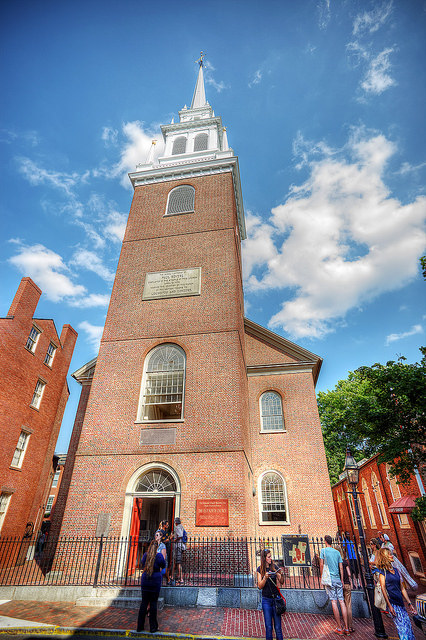
Old North Church, Boston by Matthew and Heather is licensed under CC BY-ND-NC 2.0
Want to keep learning while the library’s closed Sun-Tues? Why not take in a historical tour with National Park Service or visit the Colonialfest at the Old North Church?
Whatever you choose to do this weekend, we hope you have a happy, healthy, and safe Independence Day. And don’t forget to wear sunscreen!
Studying abroad or plan to travel overseas for research or vacation? The Tufts University community has access to Mango Languages, which you can use to learn over 70 different languages! You can complete lessons on the website or download the free app on your mobile device to practice on […]
Studying abroad or plan to travel overseas for research or vacation? The Tufts University community has access to Mango Languages, which you can use to learn over 70 different languages! You can complete lessons on the website or download the free app on your mobile device to practice on the go.
To access, log in here with your Tufts credentials, then choose quick start to use the web interface as a guest, or create your own personal profile with a separate Mango login to save your customized language tutorials.
To use the mobile app, download it from the App store or Play store and log in using the login you used to create your personal profile.
Post contributed by Berika Williams
Recent Posts
Categories
- 4th Floor Tabling (3)
- affiliation (4)
- Announcements (353)
- Book/Resource Reviews (117)
- Hours (131)
- Interviews (4)
- New Titles & Resources (114)
- News & Events (266)
- Open Workshops (48)
- Outside News & Events (66)
- resources (18)
- throwback thursday (5)
- Tips & Tricks (135)
- Uncategorized (148)
Tags
4th floor affiliation books Boston circulation crafts electronic resource electronic resources events exams extended hours food fun fun lab funlab graduation HHSL Hirsh Health Sciences Library holiday holiday hours holidays hours leisure reading library fun lab library service desk library staff new books open access open access week open workshop Open Workshops reserves resources staff statistics summer survey tea Thanksgiving therapy dogs Tufts Hirsh Health Sciences Library website welcome! writing consultants writing helpFollow us @TuftsHHSL!
Twitter feed is not available at the moment.
